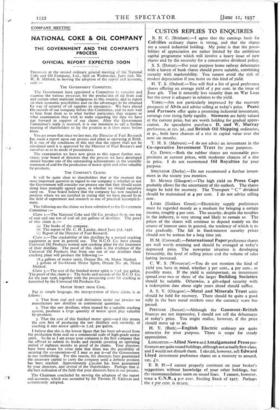• CUSTOS REPLIES TO ENQUIRIES
R. H. C. (Brixham) —I agree that the earnings basis for Colvilles ordinary shares is strong, and that the shares are a sound industrial holding. My point is that the possi- bilities of appreciation are rather limited by the ambitious capital programme which will involve a heavy issue of new shares and by the necessity for a conservative dividend policy. - S. S. (Dcirset).—For your riurpose home railway debentures with a_leaVen of bank shares shotild prove suitable, combining security with inarketabiliti. Yon cannot avoid the risk of . modest depreciation if you insist on this kind of yield.
H. T. S. (Oxford).—You will find a list of good preference shares offering an average yield of 5 per cent. in the issue of fune 4th. That is naturally less security than on War Loan but the cover is adequate in relation to the yield.
YORKS.—Am not particularly impressed by the recovery prospects of Alvis and advise selling at today's price. Pease and Partners offer quite a promising industrial investment, earnings now rising fairly rapidly. Siemens are fairly valued at the current price, but are worth holding for gradual appre- ciation. As speculative purchas is D. and W. Murray preference, at I2S. 3d.,-and British Oil Shipping ordinaries, at 9s., both have chances of a rise in capital value over the next six months.
T. H. S. (Malvern).—I do not advise an investment in the Co-operative Investment Trust for your purposes.
Co. DowN.—Both the rubber shares are reasonable pro- positions at current prices, with moderate chances of a rise in price. I do not recommend Oil Royalties for your purpose.
SPECTATOR (Derby).—Do not recommend a further invest- ment in the society you mention.
Sr. Mutico (Glasgow).—The high yield on Press Caps probably allows for the uncertainty of the outlook. The shares might be held for recovery. The Transport " C " dividend should be maintained at 4 per cent. I do not advise selling now.
LINKS (Golders Green).—Electricity supply preferences must be regarded merely as a medium for bringing a certain income, roughly 4 per cent. The security, despite the troubles in the industry, is very strong and likely to remain so. The prices of the shares will continue to depend mainly on the .course of interest rates in general, the tendency. Of which is to rise gradually. The fall in fixed-interest security prices should not be serious for a long time yet.
H. M. (Cornwall).—International Paper preference shares are well worth retaining and should be averaged at today's depressed price. The newsprint situation is developing favourably, the level of selling prices and the volume of sales having increased.
C. W. S. (Worcester).—You do not mention the kind of yield you have in mind, whether 3 per cent., 4 per cent., or possibly more. If the yield is unimportant, an investment spread over two or three of the larger Building Societies should be suitable. Otherwise, a gilt-edged security with a redemption date about eight years ahead should suffice.
A. S. Y. (Glasgow).—Metal and Minerals Trust units should be held for recovery. There should be quite a good rally in the base metal markets once the currency scare has . passed.
PERTINAX (Sussex).—Although the Caumont-British finances are not impressive, I should not sell the debentures at today's price. You might realise, however, if the price . should move up to 96.
H. Y. (Bath).—English Electric ordinary are quite attractive for your purpose. There is scope for steady appreciation.
. LorroKyNo.Allied News and Amalgamated Press pre- ferences are quite sound holdings, although not actually first-class, and I would not disturb then. I should, however, Sell Edward Lloyd investment preference shares on a-recovery to around, say, kJ.
E cannot properly Confinent on your broker' suggestions without knowledge. of your other holdings, but the -recommendations seem on sound lines. I cannot, however, trace a C.N.R. 4 per cent. Sterling Stock of 1927. Perhaps the 2 per cent. is meant.
























































 Previous page
Previous page